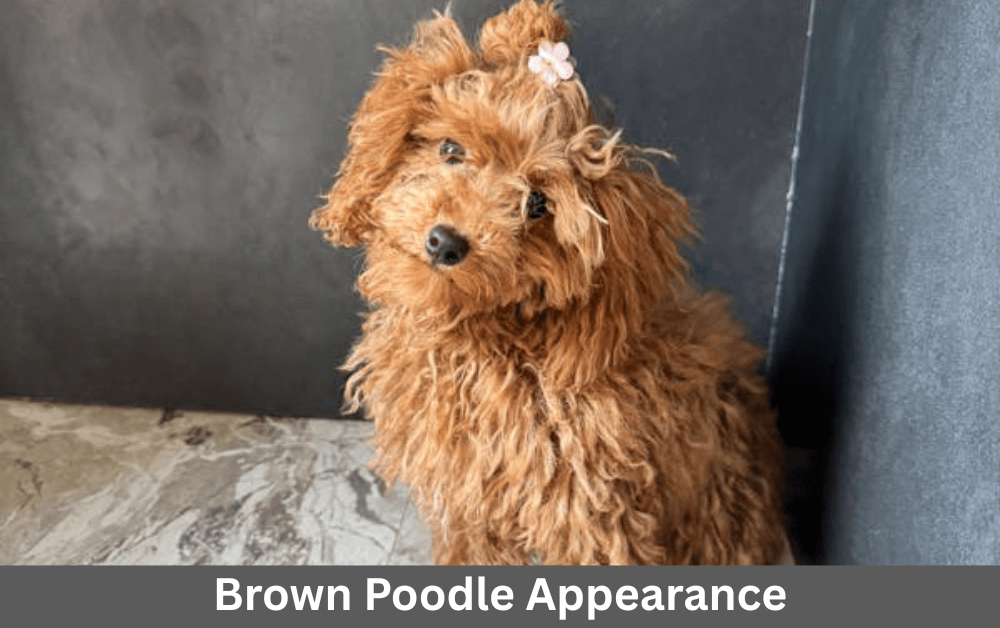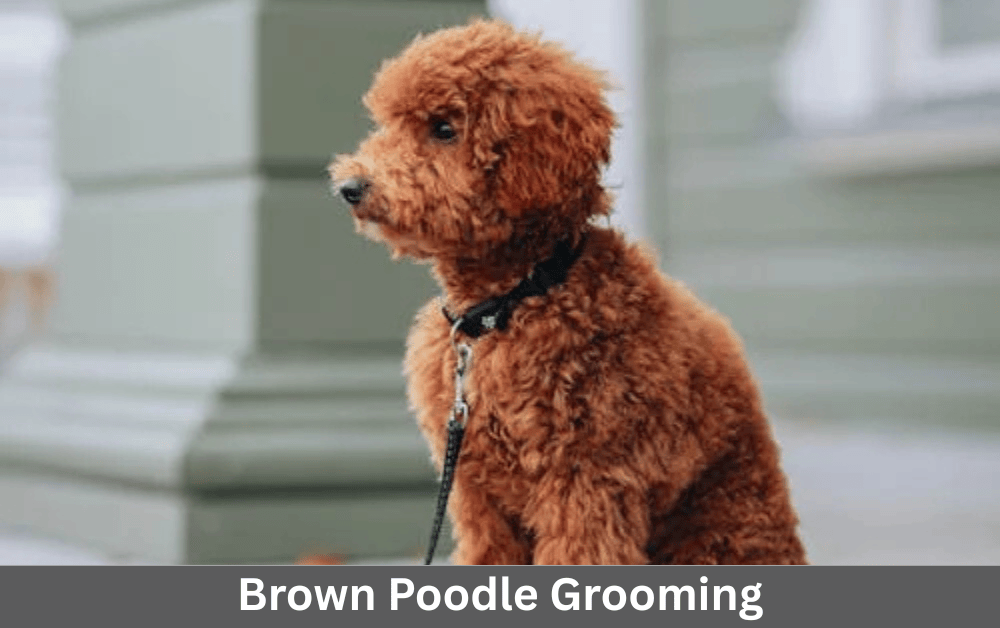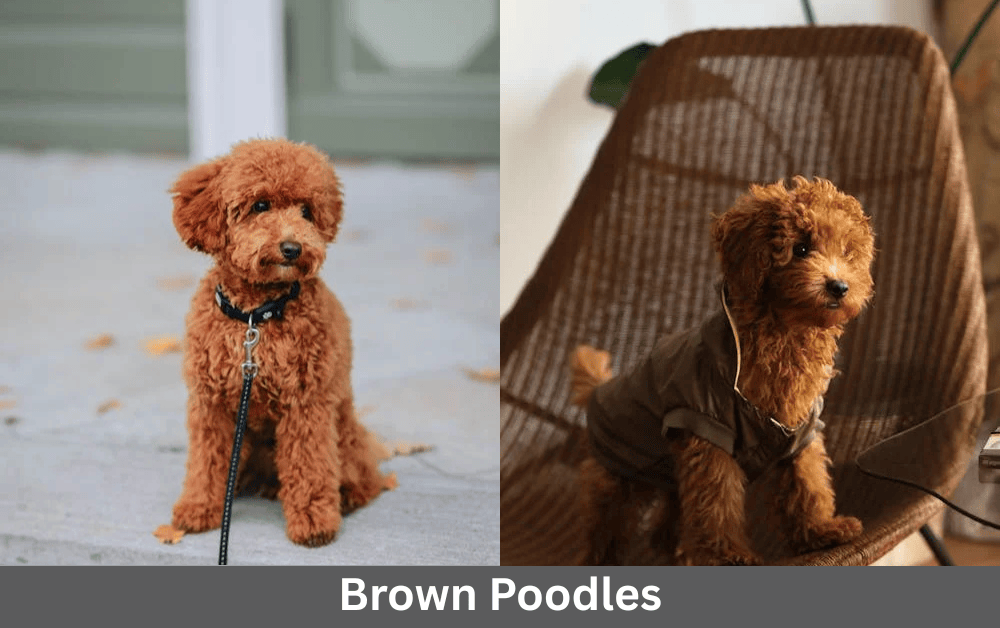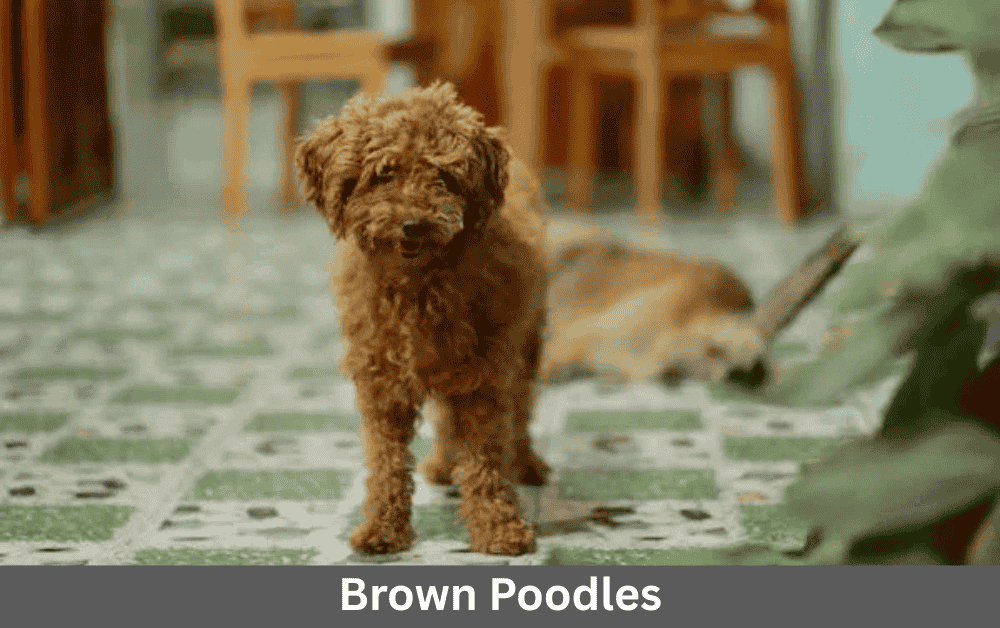Introduction to Brown Poodles
A brown poodle can fit right into your lifestyle, whether you live in a small apartment or a big house. They are also popular in dog shows because of their elegant looks. A brown poodle is a fantastic choice if you’re thinking about getting a dog. Let’s dive deeper into what makes these dogs so special.
Brown Poodle Quick Facts Table
| Category | Details |
|---|---|
| Origin | Germany, later popularized in France |
| Coat Color | Brown (ranging from light cocoa to deep chocolate) |
| Coat Type | Curly, dense, and hypoallergenic |
| Sizes | Toy, Miniature, Standard |
| Height | Toy: <10 inches; Miniature: 10-15 inches; Standard: 15-24 inches |
| Weight | Toy: 4-6 lbs; Miniature: 10-20 lbs; Standard: 40-70 lbs |
| Lifespan | 10-18 years (depending on size and care) |
| Temperament | Friendly, intelligent, loyal, playful, and adaptable |
| Trainability | Highly trainable, excels in obedience and agility training |
| Exercise Needs | Toy: 30 mins; Miniature: 45-60 mins; Standard: 1-2 hours daily |
| Grooming Needs | Brush 2-3 times weekly; professional grooming every 4-6 weeks |
| Health Concerns | Hip dysplasia, progressive retinal atrophy (PRA), Addison’s disease, ear infections |
| Diet | High-quality protein-rich dog food; avoid overfeeding |
| Good with Kids | Yes, excellent with children |
| Good with Other Pets | Yes, especially if socialized early |
| Apartment-Friendly | Yes (Toy and Miniature); Standard Poodles may need more space |
| Price | $1,000 to $3,000 (puppy); $300 to $500 (adoption) |
| Recognition | Recognized by the American Kennel Club (AKC) |
History and Origin of Brown Poodles
Poodles have a long and fascinating history. They originally came from Germany, where they were used as hunting dogs. The name “poodle” comes from the German word “pudel,” which means “to splash in water.” This is because poodles were excellent swimmers and helped retrieve game from the water. Brown poodles became popular later when breeders started focusing on their unique coat color.
The American Kennel Club (AKC) recognized brown as a standard color for poodles, and they gained fame for their beauty and intelligence. Today, brown poodles are one of the most sought-after poodle colors. They have even appeared in movies and TV shows, which makes them even more popular. Brown poodles have come a long way from hunting dogs to beloved family pets.
Characteristics & Personality of Brown Poodles

The brown standard poodle temperament is friendly, intelligent, and energetic, making them great family pets and easy to train. They are very smart and love to learn new tricks. These dogs are also loyal and enjoy spending time with their families. They are easy to go with kids and other pets, which makes them a perfect fit for families. Brown poodles are active and need regular exercise to stay happy. Their cheerful personality makes them a joy to have around.
Types of Brown Poodles
Brown Toy poodles are the smallest and are perfect for people who live in apartments or small spaces. Brown Miniature poodles are slightly larger than toy poodles and are a good choice for families who want a medium-sized dog. Brown Standard Poodles are the largest and are great for active families with plenty of space.
All three types have the same curly brown coat and friendly personality. The main difference is their size and energy levels. Standard poodles need more exercise, while toy poodles are more laid-back. A brown poodle will bring joy to your home, despite their size.
Brown Poodle Lifespan
Brown Poodle Health Issues
Brown poodles stay healthy, but they can have some health issues. Common problems include hip dysplasia, eye disorders, and skin conditions. Regular vet check-ups can help catch these issues early and improve their well-being.
To keep your poodle healthy, feed them a balanced diet and make sure they get enough exercise. Avoid overfeeding because poodles can gain weight easily. Regular grooming and dental care also play a big role in their health. Your brown poodle can live a long and happy life with proper poodle care at home.
Common Health Issues:
- Hip dysplasia
- Progressive retinal atrophy (PRA)
- Addison’s disease
- Dental Problems
- Obesity
- Sebaceous adenitis
- Ear infections
Brown Poodle Grooming and Maintenance Tips

Taking care of a brown poodle requires some effort. Their curly coats need regular brushing to prevent tangles and mats. Groom your brown poodle every 4-6 weeks to keep its coat healthy. Use a slicker brush and metal comb for best results. Bathe your poodle every 3-4 weeks with a mild dog shampoo. Trim its nails every 2 weeks to avoid overgrowth. Poodle ear cleaning is important to prevent infection.
Style its hair in a puppy cut, lamb cut, or show cut based on preference. Check its eyes daily and wipe away discharge. Always use sharp grooming scissors or clippers for safe trimming. Regular grooming keeps your brown poodle clean and happy.
- You should brush them at least two to three times a week. Many poodle owners take their dogs to professional groomers every 4-6 weeks.
- Bathing should be done once a month or when they get dirty. Brown poodles also need their ears cleaned regularly to prevent infections.
- Their nails should be trimmed every few weeks to keep them comfortable.
- Poodle dental care is very important as it can affect a poodle’s overall health. Regularly brushing their teeth is essential.
A healthy diet and plenty of exercise will keep your brown poodle in great shape. Your poodle will look and feel amazing with proper care.
Grooming Tools:
- Slicker Brush: Essential for detangling their curly coat and preventing mats.
- Comb: A stainless-steel comb helps smooth out their fur after brushing.
- Dog Shampoo and Conditioner: Use products designed for curly coats to keep their fur soft and shiny.
- Nail Clippers: Regular nail trimming is important for their comfort and health.
- Ear Cleaning Solution: Poodles are prone to ear infections, so clean their ears weekly.
Training and Socialization for Brown Poodles

These chocolate poodles are very smart, and they love to learn new things. Start training as early as 8-12 weeks old to establish good habits and routines. Use positive reinforcement, like small treats and verbal praise, to encourage good behavior. Keep training sessions short, around 10-15 minutes, to hold their attention and make learning fun. Keep training sessions fun and engaging because Poodles enjoy learning tricks and commands. They also do well in dog sports like agility and obedience. A well-trained brown poodle is a joy to have around. They will listen to you and get along with everyone.
Socialization is very important for brown poodle puppies. Make sure to introduce your poodle to different people, animals, and environments when they are young. This will help them become well-rounded and confident adults.
Exercise Needs of Brown Poodles
Brown poodles are active and energetic dogs that require regular exercise to stay healthy and happy. It is important to keep them physically and mentally stimulated. Here’s what you need to know about their exercise needs:
- Toy Poodles: Toy poodles are full of energy despite their small size. They need at least 30 minutes of exercise daily. This can include short walks, indoor play, or interactive games.
- Miniature Poodles: Miniature poodles are slightly larger and more active. They require 45 minutes to 1 hour of exercise each day. Activities like brisk walks, fetch, or agility training are great for them.
- Standard Poodles: Standard poodles are the most energetic of the three. They need 1 to 2 hours of exercise daily. Long walks, jogging, swimming, or playing in a large yard are ideal for them.
How Much does a Brown Poodle cost?

Adoption is a cheaper option, with fees ranging from $300 to $500. Keep in mind that the initial cost is just the beginning. You will also need to budget for food, grooming, vet visits, and other expenses. While brown poodles can be pricey, their loving nature and intelligence make them worth every penny.
Brown Poodle Adoption: Where to Find and What to Consider
There are many options available if you want to adopt a brown poodle. You can check local animal shelters or rescue groups. Many poodles end up in shelters and need loving homes. You can also find reputable breeders who specialize in brown poodles. Make sure to visit the breeder and meet the brown poodle puppy’s parents. Ask about health tests and vaccinations. Take your time to find the right poodle for your family because adoption is a big decision. Consider the size, energy level, and grooming needs of the poodle. Adopting a brown poodle is a rewarding experience that will bring joy to your life.
Do brown poodles make good family pets?
Poodles are protective of their loved ones and will alert you if something is wrong. They are also adaptable and can live in different environments. Whether you have a big house or a small apartment, a brown poodle will fit right in. Their loving and loyal nature makes them perfect for families of all sizes.
A family shared their experience about having a brown poodle. “Owning a brown poodle has been such a joyful experience for me! My poodle, named Cocoa, is incredibly smart and full of energy. She learns tricks very quickly, like fetching the ball or giving a high-five. Her curly brown fur is soft and fluffy, but it does require regular grooming to keep it looking neat. Cocoa loves going on walks and playing in the park, and she always makes me laugh with her playful antics. She’s also very friendly and gets along well with everyone in the family, including our other pets. Having a brown poodle like Cocoa has brought so much happiness and companionship into my life”.
Do Brown Poodles Fade?
Yes, brown poodles can fade over time. This is especially true if they spend a lot of time in the sun. Their rich chocolate color may lighten to a lighter brown or even a beige shade. This fading is more common in poodles with lighter brown coats. Limit their exposure to direct sunlight if you do not want your poodle’s coat to fade.
You can also use dog-safe sunscreen if they spend time outdoors. Regular grooming and a healthy diet can help maintain their coat color. Some poodle owners use special shampoos and conditioners to keep the color vibrant. While fading is natural, it doesn’t affect their health or personality. Brown poodles remain just as lovable and beautiful even if their color changes.
3 Facts About Brown Poodles
Hypoallergenic Coats
Brown poodles have curly, hypoallergenic coats that shed very little. This makes them a great choice for people with allergies. Their coats also require regular grooming to stay healthy and tangle-free.
Highly Intelligent
Brown poodles are one of the smartest dog breeds. They can learn commands quickly and excel in obedience training. Their intelligence makes them great at dog sports and even therapy work.
Versatile Sizes
Brown poodles come in three sizes: toy, miniature, and standard. This means there’s a brown poodle for every type of home, whether you live in an apartment or a house.
Conclusion
Brown poodles are truly special dogs that bring joy and love to any home. Their unique brown coats, friendly personalities, and high intelligence make them stand out among other breeds. You will have a loyal and playful companion, whether you choose a toy, miniature, or standard poodle. They are great with kids, get along with other pets, and adapt well to different living situations. While they do require regular grooming and care, the effort is worth it for such a loving and smart dog. A brown poodle is the perfect choice if you’re looking for a dog that is beautiful, intelligent, and full of love. They will fill your life with happiness and unforgettable memories.
Want to learn about other Poodle colors? Check out:
FAQs About Brown Poodles
Are brown poodles rare?
Yes, brown poodles are rare. Breeders need special genes to get their rich brown color. That’s why you don’t see them as often as black or white poodles.
Do brown poodles smell more than other poodles?
No, brown poodles don’t smell more than other poodles. All poodles can smell bad if you don’t clean them often. Regular baths and ear cleaning help them stay fresh.
Can brown poodles join dog shows?
Yes, brown poodles can join dog shows. The American Kennel Club (AKC) accepts brown as a standard color. Judges treat them the same as other colors.
What’s the difference between brown and café au lait poodles?
Brown poodles have dark chocolate coats. Café au lait poodles look lighter, like coffee with milk. Brown puppies usually stay darker, but café au lait ones fade more as they grow.
Are brown poodles hypoallergenic?
No, brown poodles don’t act more hyper. All poodles are active and smart. Their behavior depends on training, not their color.
Are brown poodles good for first-time dog owners?
Yes, brown poodles are great for first-time owners. They learn fast, love people, and enjoy playing. Just give them time, care, and exercise.

